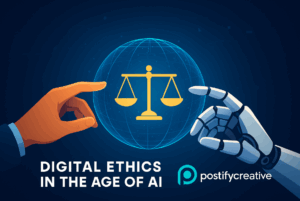In a world increasingly driven by algorithms, artificial intelligence, and big data, digital ethics has emerged as one of the most critical conversations of our time. It is no longer just about what technology can do—but what it should do. As digital tools permeate every aspect of our lives, from healthcare and education to governance and personal communication, ethical considerations are becoming inseparable from technological development and use.
What is Digital Ethics?
Digital ethics refers to the study and evaluation of moral issues related to digital technologies. It includes questions around privacy, data protection, surveillance, artificial intelligence, algorithmic bias, digital rights, and the impact of technology on human behavior and society.
In simpler terms, digital ethics asks:
“How do we ensure technology serves humanity, rather than harms it?”
Why Does Digital Ethics Matter?
Technology evolves at breakneck speed. Ethical frameworks, laws, and social norms often lag behind. This gap can lead to unintended consequences—some minor, others potentially catastrophic.
Consider these real-world examples:
- Data Breaches: Millions of personal records exposed due to poor data security practices.
- AI Bias: Facial recognition systems misidentifying people based on race or gender.
- Surveillance: Governments and corporations monitoring individuals without consent.
- Disinformation: Algorithms promoting fake news or divisive content for profit.
Each of these cases illustrates how technology, when unchecked by ethical standards, can violate trust, exacerbate inequality, and even undermine democracy.
Key Principles of Digital Ethics
To build a more ethical digital future, several guiding principles have been proposed and adopted globally:
- Transparency
Users should understand how digital systems make decisions that affect them. Algorithms should not be “black boxes” that operate without scrutiny. - Privacy
Individuals have the right to control their personal data. Organizations must ensure secure data practices and obtain informed consent. - Accountability
Developers, companies, and governments must be held responsible for the digital tools and platforms they create and use. - Fairness and Non-Discrimination
AI systems must be designed to avoid bias and ensure equitable treatment across race, gender, age, and other demographics. - Human-Centric Design
Technology should augment human well-being, not replace it. Systems should be designed to enhance dignity, autonomy, and agency.
The Role of Stakeholders
Ethical responsibility doesn’t fall on technologists alone. Multiple stakeholders must collaborate:
- Developers & Engineers: Embed ethical considerations into design and code.
- Businesses: Prioritize ethics alongside profit—especially in product development and data handling.
- Governments: Enact and enforce regulations that protect citizens in digital spaces.
- Educators: Teach digital literacy and ethics as part of core curricula.
- Users: Stay informed and demand greater transparency and accountability from tech providers.
Challenges in Implementing Digital Ethics
Despite growing awareness, implementing digital ethics is far from straightforward:
- Global Disparities: Different countries have different laws, cultural norms, and attitudes toward privacy and technology.
- Corporate Resistance: Profit motives may conflict with ethical concerns, especially when ethical decisions may slow innovation or reduce revenue.
- Technological Complexity: As systems grow more complex, tracing ethical faults or correcting issues becomes harder.
Towards a More Ethical Digital Future
Creating a digitally ethical world requires both vigilance and vision. It’s not enough to react to scandals and crises—we must proactively build ethical standards into the DNA of digital systems.
Here’s what we can do:
- Advocate for ethical tech policies at both national and international levels.
- Support diverse teams in tech development to avoid narrow perspectives and implicit bias.
- Promote digital literacy among users so they understand their rights and the systems they interact with.
- Encourage ongoing ethical audits of AI systems, platforms, and digital services.
Conclusion
Digital ethics is not a luxury—it’s a necessity. As technology shapes our future, ethical choices will determine whether that future is inclusive, fair, and humane. The digital revolution is here; now it’s time to ensure it aligns with our highest values.
Let’s build a digital world that not only works—but works for everyone.




